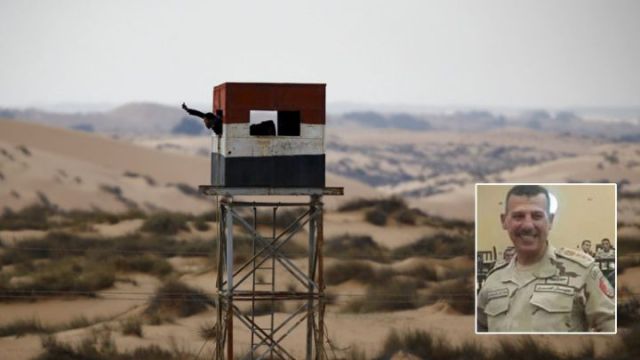I was planning to write something completely different this weekend, but the events in Egypt have dictated my choice.

An Egyptian policeman gestures from an observation in the Sinai peninsula, February 10, 2016, and an undated photograph of Brig. Gen. Adel Rajaei.Amir Cohen, Reuters
via -Haaretz
Cairo—Brig. Gen. Adel Ragai, commander of the Egyptian Army’s Ninth Armored Division, was assassinated in broad daylight in Cairo. Brig. Gen. Adel Rajaei, 52, had commanded Egypt’s counterterrorism operations in Sinai, his brigade was also working to destroy smuggling tunnels that have been built under the Egyptian border with the Gaza Strip. This assassination came after last week’s murder of 12 Egyptian conscripts in an ISIS attack on security checkpoint in central Sinai, and three Egyptian soldiers were killed this week.
A little known terrorist group Liwaa al-Thawra has claimed responsibility, highlighting an evolution of new terror groups, well trained and capable of targeting senior figures in Egypt’s powerful army. Although there have been several attacks in the last decades against Egypt’s police, attacks on army leaders are rare in Egypt. In fact, I have no recollection (although I stand to be corrected) of any attacks on army figures since the assassination of President Sadat in 1981.
Several new violent groups have emerged in Egypt since the ousting of Morsi in July 2013 and the rise of army leader and the current president Abdul Fattah el-Sisi—groups such as Molotov, Hazmoun, lone wolves, Helwan Brigade, and others.
Two groups, however, have captured the attention of media and antiterrorism observers by their upscale attacks: Hasm and Liwaa al-Thawra.
Hasm
Hasm, whose name means “decisiveness” in Arabic, emerged in October 2014. The group’s first statement claimed that it is committed to “creative peacefulness,” a term invented by some Muslim Brotherhood’s youth, and was backed, according to the Arabic version of Ahram, by many anti-coup Islamists figures, such as New York- based Egyptian American activist Ayat Oraby, Bassem Khafagi, a previous American Islamic CAIR group’s “community affairs director” and the previous owner of Sharq TV, and Moataz Matar, a TV presenter on the same channel, who was sentenced in Egypt for 10 years in jail in absentia.
The group also was believed to be behind the failed assassination attempt of Egypt’s former Grand Mufti Ali Gomaa last August. Later, in September, the group claimed responsibility for the attempted assassination of the assistant prosecutor general Zakaria Abdel Aziz who, along with his entourage, escaped unscathed. On October 19, 12 members of Hasm were arrested in Qalyubia Governorate, accused of belonging to an illegal group, according to Shorouk News.
Hasm also released a statement praises Adel Ragai’s assassination operation by Liwaa al-Thuwra. Moreover, according to Mokhtar Awad, a research fellow in the Program on Extremism at George Washington University, Hasm uses in its propaganda some of Hamas’s propaganda songs (Nasheed); further the group hinted in one of its videos that it has training camps, which, if true, would mean a huge upscale in the group’s skills and capabilities.
Liwaa al-Thawra
Last August saw the launch of Liwaa al-Thawra, “the Revolution Brigade,” which was, interestingly, by the Hasm group. The group claimed responsibility for an armed attack in the Nile Delta governorate of Al-Menoufiya, which killed two security personnel and injured five others, including two civilians.
On October 4, Egyptian security forces raided an apartment in Cairo’s southern Bassateen district and killed a senior Muslim Brotherhood leader Mohamed Kamal, 61, a member of the group’s top leadership council, and another Islamist Yasser Shehata. What is significant in Liwaa al-Thawra’s statement, claiming responsibility for the murder of Brig. Gen. Adel Ragai, is reference to late Brotherhood leader Mohamed Kamal. For the first time a new group made an open direct link between the Brotherhood as a group and the violence, i.e., target assassinations on the street of Egypt. The statement also makes a clear reference to Egypt’s destruction of the tunnels in Sinai near the border of Gaza. The significance of all those links were highlighted, again, by Researcher Mokhtar Awad in a string of insightful tweets.
https://twitter.com/Mokhtar_Awad/status/790018597808517120
https://twitter.com/Mokhtar_Awad/status/790019085408964608
https://twitter.com/Mokhtar_Awad/status/790019501085515776
https://twitter.com/Mokhtar_Awad/status/790052812784709632
Furthermore, other regime opponents such as international lawyer Mahmod Refaat (with 341 thousand followers on Twitter) claimed that the Sisi regime, in cooperation with Palestinian politician Mahmoud Dahlan, is behind the assassination of the army general. Such a ludicrous claim is not new from the anti-regime opponents camp, which always rush to a knee-jerk denial every time there is a major attack on any regime figure. Nonetheless, a closer look at many Islamist social media, the gloating and celebratory mood cannot be ignored.
The murder of army general Adel Ragai is a new turning point in the history of Egypt’s insurgency. Its slick professional finish suggests a high level of training. No wonder some Egyptians suggest that it could be an intelligence job from a foreign country and not just a small angry group of youth. The challenge now for the Egyptian authority is to bring the killers to justice and to prevent any future attacks, without looking desperate or paranoid. Fighting insurgencies can take decades and be tricky in a country with an ailing economy, weapons smuggling, limited freedom of expression, and many desperate angry youth.


Reblogged this on Ned Hamson's Second Line View of the News and commented:
Is there a way out, a way forward?
LikeLike